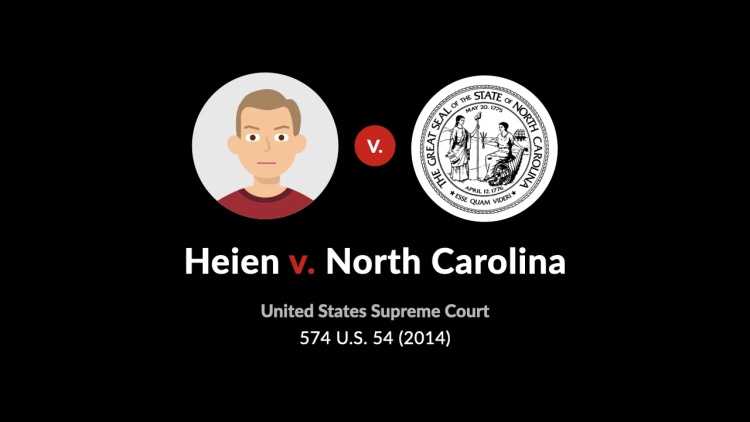Heien v. North Carolina
United States Supreme Court
574 U.S. 54 (2014)

- Written by Rich Walter, JD
Facts
The State of North Carolina (plaintiff) prosecuted Nicholas Brady Heien (defendant) on drug charges related to cocaine that a police officer found in Heien’s car. The officer had stopped the car for operating with only one of its two brake lights working. The officer believed this to violate state traffic laws. The trial judge denied Heien’s motion to exclude the seized cocaine from evidence. Heien was convicted and appealed to the North Carolina Court of Appeals, which reversed the trial judge’s ruling. The appellate court noted that the applicable North Carolina traffic law required only one working brake light, and therefore the police officer’s initial traffic stop was unjustified. Without proper justification, the officer’s search of Heien’s car and seizure of the cocaine violated Heien’s Fourth Amendment rights. The state appealed to the North Carolina Supreme Court, which reversed the appellate court on the grounds that the officer reasonably misinterpreted an ambiguously worded traffic law, and therefore a traffic stop based on that misinterpretation was justifiable. On remand, the appellate court affirmed the trial judge’s evidentiary ruling. On appeal, the North Carolina Supreme Court affirmed the appellate-court judgment. Heien appealed to the United States Supreme Court, which granted certiorari.
Rule of Law
Issue
Holding and Reasoning (Roberts, C.J.)
Concurrence (Kagan, J.)
Dissent (Sotomayor, J.)
What to do next…
Here's why 907,000 law students have relied on our case briefs:
- Written by law professors and practitioners, not other law students. 47,100 briefs, keyed to 996 casebooks. Top-notch customer support.
- The right amount of information, includes the facts, issues, rule of law, holding and reasoning, and any concurrences and dissents.
- Access in your classes, works on your mobile and tablet. Massive library of related video lessons and high quality multiple-choice questions.
- Easy to use, uniform format for every case brief. Written in plain English, not in legalese. Our briefs summarize and simplify; they don’t just repeat the court’s language.





